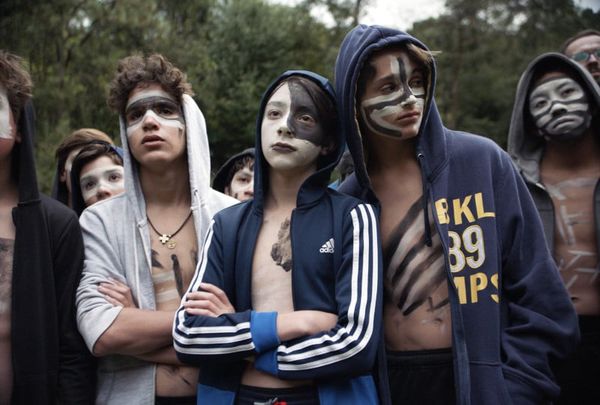Eye For Film >> Movies >> The Hole In The Fence (2021) Film Review
The Hole In The Fence
Reviewed by: Amber Wilkinson

The beginning of Joaquin del Paso's film may begin with verdant, bucolic photography, birds singing and upbeat music, but as soon you see the bus arriving at the Los Pinos (The Pines) camp and the adolescent boys piling off it, you'll be able to guess at the sort of toxic masculinity that's about to be on display.
The kids are here in the Mexican countryside, penned in by the fence of the title, for a religious summer camp, where they are warned, "Stay away from the locals and remember you are being watched at all times". The veiled threat wrapped in that, is something the adults in the group major in, their prayers and donations to the local township cloaking a much less altruistic agenda of instilling the importance of the class system and a natural sense of superiority into the boys.

This is largely an ensemble film, with the children involved operating, as groups of youngsters in these sorts of situations often do, more like a single organism, except, of course, when they're singling out someone for not quite fitting in enough. The indigenous scholarship kid is the most obvious target, his own actions later driven by an attempt to melt into the group, but those perceived to be less than full-blooded heterosexuals of the species had also better beware - and it's not just the children picking targets.
There are different sorts of psychological power games at work here. Beyond the regular physical bullying, there's also trouble brewing for Diego (Erick Walker), whose neck, arm and leg are in various braces and who is given regular medication by the older Eduardo (Yubáh Ortega) - the medication hand-out is, indeed, one of the more pointed critiques in the film, as we see just how many of these kids are being dosed up. It's fair to say that del Paso is giving themes familiar from the likes of Lord Of The Flies through to Monos a run over the jumps but despite being rather on the nose in terms of his plot beats, he has an eye for a strong image and a psychological feel for the insidious viewpoint of the adults, washing over the children like a bad benediction and instilling in them a fear of 'the other' in all its forms. The wider sociopolitical argument never quite comes fully into focus but as a moody meditation on the poisons of privilege, it certainly has its moments.
Reviewed on: 12 Sep 2021















